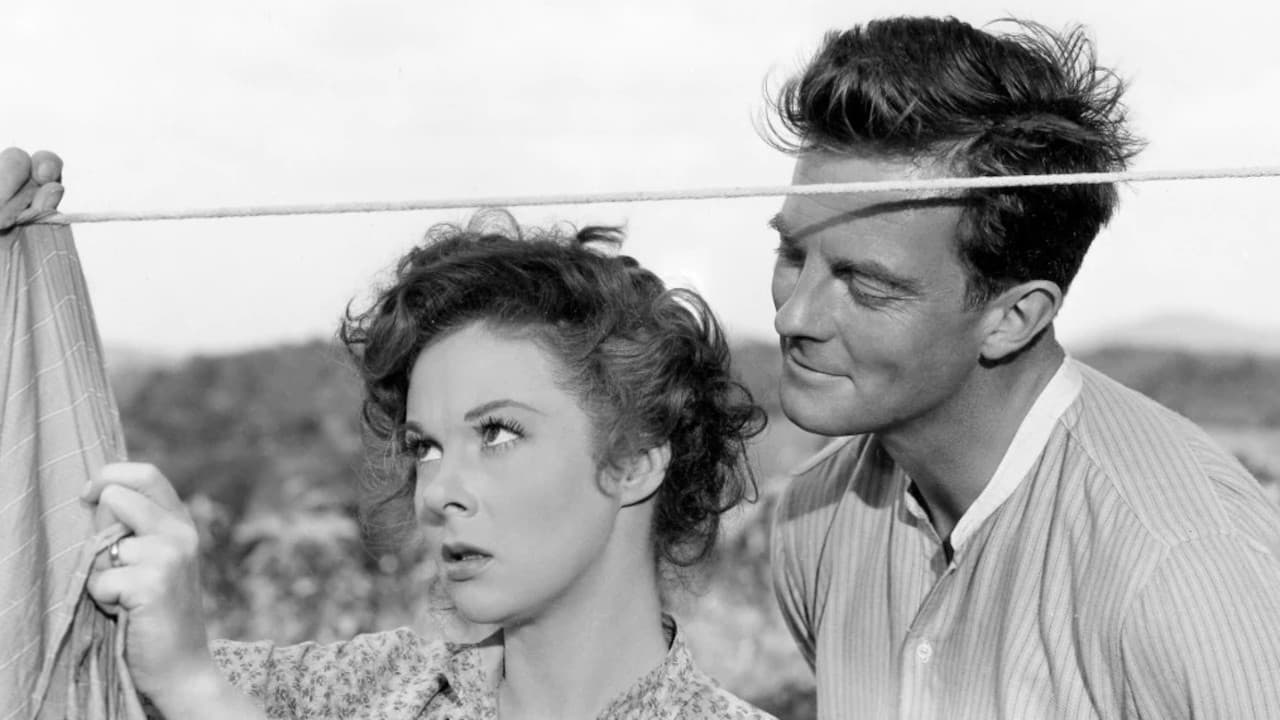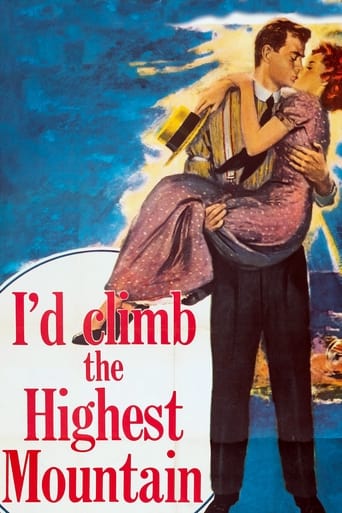

i know i wasted 90 mins of my life.
... View MoreThis is one of the few movies I've ever seen where the whole audience broke into spontaneous, loud applause a third of the way in.
... View MoreIt’s sentimental, ridiculously long and only occasionally funny
... View MoreBlistering performances.
... View MoreLamar Trotti, one of the finest writers in Hollywood during its golden age, was a native of Atlanta. The year before he died, he was both producer and screenwriter for this tale of a Georgia mountain preacher and his beautiful wife in the early years of the 20th century. The movie was shot on location in what was then a very rural area of the state, and Trotti promised the locals that their culture would be respected.He kept his word. "I'd Climb the Highest Mountain" avoids condescension toward the people of Appalachia and their religion, which makes it an unusual film. But thankfully it's not too sentimental either, though it is ultimately an inspirational film.The story is adapted from a 1910 novel by Corra Harris, a Georgia writer who was once nationally famous, and somewhat controversial, though she was not much remembered by the time the movie was made. Harris had been married to a minister herself, but the story was not autobiographical. It does have the ring of authenticity, though. The backwoods was really the backwoods a century ago, and a stylish, city-bred woman would have felt restless even if she was deeply in love. Henry King was a great choice to direct the film. He was religious himself, and at home with the material, and he had begun his long filmmaking career in the era in which the story takes place. Stars William Lundigan and Susan Hayward do an adequate job, though she seems just too glamorous for her surroundings. Ironically, from today's perspective, the fact that Lundigan is no longer much of a "name" makes him a better fit for the role of the preacher.The scenery is a big part of the film's appeal. North Georgia is not as spectacular as the Rockies, or even the Great Smokies, but it is a gorgeous area. And it was largely unspoiled when this movie was made.I notice that many Georgians writing about this movie have strong memories of the time when it was being made. In those days, it was rare indeed for a motion picture to be shot in Georgia. People drove from hours away to see what Hollywood types looked like. Susan Hayward's move to Georgia in the late 1950s had nothing to do with this film, and her new home wasn't in the mountains, but what she did was unusual for a Hollywood star of that era. She met and married a Georgian with the unglamorous name of Eaton Chalkley, and she lived with him on his farm when she wasn't making films. Chalkley was the love of her life. When he died, she moved out of the state because she couldn't bear to live at their home without him. When she herself passed away, she was buried beside him, in the cemetery of a church near his farm.Whenever I see "I'd Climb the Highest Mountain," I think of the Chalkleys.
... View MoreThis movie is a great representation of the many challenges that a minister faces in his career and it is well written from the wife's prospective. It shows that a minister is made better and stronger by a good wife by his side. The setting is North Georgia and shows the wonderful Georgian countryside. The writing is also very good. I think what makes me like this movie most is the fact that this is the one of maybe two times that Hollywood, pre-nineteen sixty, actually portrays evangelical Christians as not only normal people but honestly devout and truthful to the Bible. It really lifts you up and makes you remember that there are people who do live by the Bible and that makes them better people.
... View MoreWilliam Lundigan and Susan Hayward starred in this 1951 film regarding the trials and tribulations of a preacher and his wife.The scenery was truly beautiful in the part of Georgia where the film was made.Alexander Knox, so memorable in 1944's Wilson, steals the film in another wonderful performance as the dirt farmer, a non-believer, whose child drowns accidentally while under Hayward and Lundigan's care. That scene in itself will just tug at your heart.A film of the human spirit beautifully realized by Lundigan and Hayward.
... View MoreSimple, easy-to-take evocation of a 19th century rural religious life in Georgia, "I'd Climb the Highest Mountain" is one of director Henry King's profoundest and most personal works. I just saw it for the first time. A friend recommended it to me a while back, told me it's a timeless experience I would never forget. My expectations were further aroused when I found out the director had been Henry King, one of the most underrated American directors of his time. The screenwriter is Lamar Trotti, who used to collaborate with John Ford, and who previously worked with director King in films "In Old Chicago"(1937), "Alexander's Ragtime Band"(1938) and "Captain From Castile"(1947).Filled with lush, resplendent scenery of Georgia's Blue Ridge Mountains & gorgeously photographed in Technicolor, "I'd Climb " is the uplifting story of a dedicated, scrupulous preacher William Thompson (William Lundigan) and his marriage to a charismatic city girl Mary Elizabeth (Susan Hayward). They settle in a small peaceful town populated by simple town folk trying to live, survive happily and peacefully. Hayward and Lundigan are outstanding throughout, and give some of their most moving performances. Narrated by Elizabeth, the story flows nicely through several moments of tenderness. The preacher heals the community, providing hope and support in time of a fever epidemic, and transforms an atheistic neighbor into accepting the community's uncomplicated way of life. Nothing of significance happens; it is a film of hope and harmony, a sense of time and place, beautifully realized.
... View More